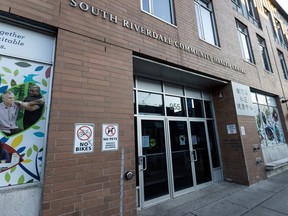Announcement to come Tuesday in a speech from Health Minister Sylvia Jones to conference of municipal leaders.
Article content
The Ford government is closing several so-called safe drug consumption sites near schools across the province and investing in new centres focused on treatment and support services.
Advertisement 2
Article content
The announcement will be made Tuesday afternoon in a speech from Health Minister Sylvia Jones to a gathering of municipal leaders.
Under the new regulations, consumption sites, drug dens really, where people take hard drugs like heroin, fentanyl and other substances, won’t be allowed within 200 metres of a school. This change will see 10 sites close in Ottawa, Guelph, Hamilton, Thunder Bay, Kitchener and Toronto no later than March 31, 2025.
That means the South Riverdale Community Health Centre in Toronto will have to close its consumption site. The SRCHC became a source of controversy last summer after Karolina Huebner-Makurat, a 44-year-old mother of two, was shot and killed by stray bullets after a gunfight broke out in a parkette adjacent to the consumption site.
Article content
Advertisement 3
Article content

Huebner-Makurat had simply been walking down the street when the bullets hit her.
After hosting a consumption site and being chosen by the Trudeau government in Ottawa to host a so-called safe supply site where drugs are handed out for free, the SRCHC became a magnet for drug dealers. People getting their supply of supposedly safe drugs at the centre would sell or trade them to the dealers for a hit of more potent, and deadly fentanyl.
The Ford government points to the rise in crime around these centres as a reason some will close, and others will change to focus on treatment and support services.
In areas surrounding the sites in Toronto, the government reports that assaults are up 113% and robbery up 97%. Reports of violent crime are up 195% near sites in Hamilton when compared to the rest of the city while in Ottawa they are up 250% compared to the rest of the city.
Advertisement 4
Article content
These centres were sold as a way to connect addicts with treatment when they were ready to kick the habit. That hasn’t happened and instead we’ve seen higher crime and activists running these centres who aren’t interested in treatment.
While provincial regulations demand that such sites offer users a path to treatment, most if not all have stopped viewing the act of offering treatment as judgmental. At the SRCHC, its website openly stated that the organization had, “No judgement, no expectations and no desire for people to stop using drugs.”
That philosophy was proudly displayed on its website and on printed material until after last year’s tragic shooting and the twisted philosophy was published in this newspaper publication. Sadly, Toronto’s SRCHC wasn’t alone and the view that taking hard drugs is an acceptable lifestyle choice, even for people clearly struggling, permeated throughout the system.
Advertisement 5
Article content
On Tuesday, Jones will announce that the province will invest $378 million in 19 locations that they are calling “Homelessness and Addiction Recovery Treatment (HART) Hubs.” These hubs will include what the province describes as 375 “highly supportive housing units” as well as addiction recovery and treatment beds.
The government says that since these sites are focused on treatment, they will not be offering the “safer” supply model pushed by the federal government. In addition to wellness and treatment programs, the Ford government says they will be putting a new emphasis on prevention to try and stop people from becoming addicted in the first place.
Recommended from Editorial
-

Leslieville residents skeptical of Ford government’s plans to clean up drug site
-

LILLEY: Ford government begins takeover of Leslieville drug site
-

LILLEY: Doug Ford needs to shut down or take over safe injection site
Advertisement 6
Article content
This is a welcome move given how far we have gone down the harm reduction rabbit hole.
The four pillars of drug policy in Canada have long been prevention, enforcement, harm reduction and treatment. For the past several years, the other three pillars have been ignored with all emphasis put on harm reduction.
Given the way we’ve been practicing harm reduction, it’s been more like aiding and abetting addicts instead of offering them compassionate care.
These moves will be welcomed by many mayors, including in communities where some sites will be closing. Others will rail against these changes but ask them, what have they done to support treatment beyond giving people free drugs and a place to use them?
RECOMMENDED VIDEO
Advertisement 7
Article content
CLOSING SITES
Guelph Community Health Centre on Wyndham St. N.
Hamilton Urban Core Community Health Centre on James St. S.
NorWest Community Health Centre on Simpson St. in Thunder Bay
Parkdale Queen West Community Health Centre on Bathurst St. in Toronto
Regent Park Community Health Centre on Dundas St. in Toronto
Region of Waterloo Public Health and Emergency Services on Duke St. in Kitchener
Somerset West Community Health Centre on Eccles St. in Ottawa
South Riverdale Community Health Centre on Queen St. E. in Toronto
Toronto Public Health (The Works) on Victoria St. in Toronto
Kensington Market Overdose Prevention Site on Augusta St. in Toronto
Article content




